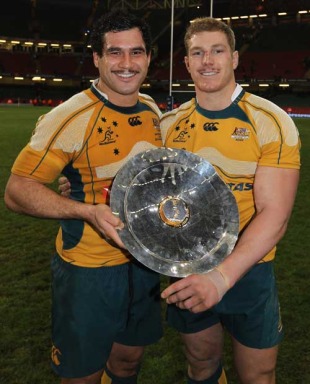|
Wales 12-33 Australia, Millennium Stadium, November 28
Pocock's burst too much for Wales
Huw Baines
November 27, 2009

George Smith and David Pocock shared the duty of terrorising Wales at the breakdown
© Getty Images
Enlarge
World rugby has already seen the emergence of a special talent on the openside flank this season in Springbok fetcher Heinrich Brussow and the 74,000 packed inside the Millennium Stadium to watch Australia dismantle Wales saw the blooming of another. Western Force product David Pocock has shunted the veteran George Smith on to the bench in recent months and on this evidence the battle between the two for the Australian No.7 jersey will be a thrilling sub-plot during next season's Super 14. Rested for last weekend's loss in Scotland, Pocock lasted until half-time in Cardiff before being forced off with a dislocated thumb, which he delightfully tried to pop back in himself. What a 40 minutes it was. At times both destructive and creative, he swarmed all over Wales at the breakdown, won numerous high-balls and showed his intelligence in support by rounding off the Wallabies' third try. Wales could not take the ball in to contact in the first-half without having a hellish fight to get it back. That Smith continued this trait in the second period is testament to the exciting to-and-from that could emerge next season. Pocock's performance, that of the Australian tight-five and resurgent fly-half Matt Giteau came together to blow away a Wales side that has taken several big steps back since last season. The pace and precision of the Australian attack in the first-half was mesmerising, recalling their thrilling win over South Africa during the Tri-Nations. Following last weekend's defeat they weren't so much kicked on the ground by the press as relieved of their front teeth, wallet and keys and their response was devastating. Their three first-half tries were all set up through quick ball, well-judged running angles from deep and an air-tight kicking game from Giteau. In a world of 'aerial ping-pong' the Wallabies showed the way to play a high-intensity game without leaving the back door open for counter attacks. The pressure they exerted at the breakdown left Wales unable to budge them in defence or attack and it's here that the game was won. Wales can point to losing skipper Ryan Jones to a back injury as a setback before kick-off and they were also dealt the body-blow of losing talismanic wing Shane Williams inside the opening five minutes. He was followed to the sidelines by Leigh Halfpenny and Matthew Rees before half-time. In reality, Wales were out of this after 50 minutes. Having miraculously kept in touch up until half-time with four penalties they squandered 13 points after the restart. Two penalties went awry before Jamie Roberts and Tom James conspired to highlight Warren Gatland's side's debilitating lack of finishing prowess. A simple two-on-one was squandered as James ran away from the pass and Roberts delayed - a telling image of the muddle that Wales' attack has become since their 2008 Grand Slam. Their game was founded on support play and the ability to offload out of the tackle when under pressure. There was plenty of this from Australia, and it was mightily effective. Wales attacked alone, crashing headlong in to contact and pinching the ball below their body to render quick ball impossible. Roberts' opportunity was forged by the one occasion that a Welsh player, fly-half Stephen Jones, was able to free his hands and bring support in to a hole. They have missed Lee Byrne, whose lines from fullback are superb, and also the extra work of Adam Jones at the breakdown. Stand-in skipper Gethin Jenkins has a massive work-rate but is not Superman. He was part of a Welsh tight-five that did well to finish second to the Wallabies and was left alone in much of the dirty work. Rees' injury also proved a turning points as their lineout went to pieces following the introduction of Huw Bennett - from metronomic against the Pumas to a shambles against the Wallabies, it's another big area of concern. Sam Warburton enhanced his reputation with several powerful, quick bursts while Andrew Bishop and James battled well. It's definitely about small victories for Wales in the aftermath. So, Wales' next game is against England at Twickenham in the opening game of the Six Nations and they'd better get to work straight away. The Wallabies have answered some critics and can rightly claim to be the most exciting side with ball in hand in the world at the moment. Their aim is the Rugby World Cup in 2011 - but the results will have to keep improving if they are to retain the good grace of fans as they build. © Scrum.com Huw Baines is the Assistant Editor of ESPNscrum.
|
Live Sports
Communication error please reload the page.
-
Football
-
Cricket
-
Rugby
-
- Days
- Hrs
- Mins
- Secs
F1 - Abu Dhabi GP
Abu Dhabi Grand Prix December 11-131. Max Verstappen ()
2. Valtteri Bottas (Mercedes)
3. Lewis Hamilton (Mercedes)
4. Alexander Albon ()
5. Lando Norris ()
6. Carlos Sainz Jr ()
-
ESPNOtherLive >>
Darts - Premier League
Golf - Houston Open
Snooker - China Open
Tennis - Miami Open

